Yes, but it depends on where the content appears and how you’re trying to remove it.
Google operates local versions of its search engine in many countries—like google.co.uk, google.ca, google.de, and google.com.au. If negative or private content shows up on one of these international domains, removal is possible, but the process can vary based on region and the type of content.
Here’s what to know.
More DB Insights: How to Remove Google Search Results
How International Search Results Work
When you search Google in a specific country, the engine automatically tailors results based on your location—even if you’re technically using google.com. That means content hosted in another country might still appear in your results if it’s relevant or ranks well.
This matters for removal because even if you get something taken down in one country, it may still appear elsewhere.
Can You Remove Results Globally?
Yes—but it’s rare. Most Google removal tools and legal takedowns apply only to the region where the request was submitted.
For example:
- A successful takedown in France (under the Right to Be Forgotten) may only affect google.fr.
- A DMCA request filed in the US typically removes content from google.com—but not from other regional versions.
- Personal info removals (via the Results About You tool) work across most Google domains, but enforcement varies.
Country-Specific Laws Matter
Europe has stronger privacy laws than the US. Countries like Germany and France allow people to request removal of search results under the Right to Be Forgotten. Australia, Canada, and the UK also have defamation and privacy laws that can support removal, but they’re often enforced differently.
If your content appears in a foreign news outlet, blog, or court database, you may need to work with legal counsel in that country to push for removal or deindexing.
What About Deindexing?
Sometimes the best approach is deindexing, which hides the content from Google search without deleting it from the website. You can request deindexing directly from Google or ask the site owner to add a “noindex” tag to the page.
While it may not erase the content, deindexing is usually effective across multiple country domains—especially when handled by professionals.
What We Recommend
If you’re trying to remove search results from international domains:
- Check where the content is hosted—and which Google versions it’s appearing on.
- Use the right removal tool, like the Legal Removal Request or Results About You.
- Work with experts familiar with international takedowns if it involves non-U.S. laws or foreign publishers.
At ReputationDB, we’ve handled removals across Europe, Australia, Canada, and beyond. If your unwanted content is showing up overseas, we can help you figure out the fastest path forward.
Book a free consultation and let us review your case. We’ll help you understand what’s possible—no matter where the content appears.




